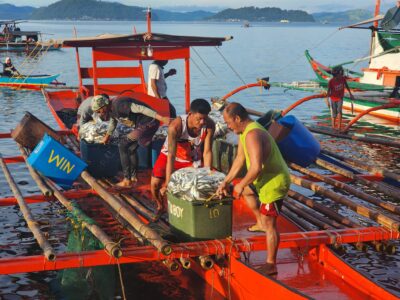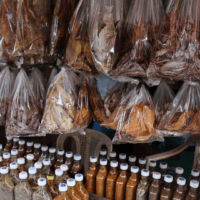Fish in Nutrition Systems
Reduce Fish Loss and Boost Livelihoods
SHARE TO SHOW YOUR SUPPORT:
Overview
Oceana’s new campaign in the Philippines centers on Reduce Fish Loss & Boost Livelihoods aims to address a critical issue in the Philippines: the significant loss of fish catch by small-scale or artisanal fishers. Currently, up to 40% of their catch is wasted due to inadequate preservation methods, limited infrastructure, and lack of access to cold storage facilities. This not only impacts their income but also contributes to food insecurity and nutrition deficiency in coastal communities. Through this initiative, we aim to reduce post-harvest losses by improving access to better preservation techniques and infrastructure. By working with local governments and communities, we strive to create lasting solutions that can improve the livelihoods of fishers, enhance food security, improve nutrition, and reduce waste in the fisheries sector. The campaign will begin in Samar, targeting key areas for intervention, scaling these improvements across the region, and fisheries management areas, and eventually nationwide.
Background
Fisheries play a vital role in ensuring food security and sustaining livelihoods in the Philippines, particularly for coastal communities. However, post-harvest loss has remained a persistent challenge, exacerbating the hardships of small-scale fisherfolk. Since its inception in the Philippines, Oceana has championed the creation and implementation of science-based fishery management laws and regulations. Building on successes like the establishment of Fishery Management Areas (FMAs) and a national sardine management plan, Oceana has now focused on addressing post-harvest loss.
Post-harvest loss refers to the significant portion of the catch that is lost due to spoilage or poor handling practices. In the Philippines, small-scale fisherfolk are disproportionately affected, as they lack access to infrastructure such as cold storage, landing centers, and processing facilities. Oceana’s recent study in Samar revealed that 40% of the fish caught by volume is subject to physical and quality loss, making the region a priority for intervention.

Why Daram, Samar?
This campaign aims to reduce post-harvest fish losses and improve the livelihoods of small-scale fisherfolk. The initiative is aligned with Oceana’s broader strategy of tackling the ecological, economic, and nutritional threats posed by post-harvest loss. By collaborating with local governments, universities, and national agencies, the campaign seeks to equip fisherfolk with the tools and facilities needed to maintain the quality of their catch, such as cold storage systems and fish landing centers. These interventions are designed to ensure fisherfolk can sell their catch at fair prices, rather than losing income due to spoilage.
Daram, chosen as the first site for this campaign, has the largest municipal waters in the Samar Sea and a poverty rate of over 40%. The municipality’s dependence on fishing for livelihoods makes it a fitting location to pilot these solutions. The partnerships established through previous Oceana campaigns, including FMA development and sardine management, provide a strong foundation for building a comprehensive response to post-harvest loss.
The successful launch of Oceana’s campaign to Reduce Post-Harvest Fish Loss and Boost Livelihoods in Daram, Samar, is a significant step forward in addressing the pressing issue of post-harvest loss in the Philippines. By engaging key stakeholders and laying the groundwork for legal and practical solutions, the campaign offers a sustainable path for improving fisherfolk livelihoods and ensuring food security. Oceana remains committed to expanding this initiative across the country, ensuring that the benefits of reducing post-harvest losses and boosting incomes reach fisherfolk nationwide.
Resources
- The State of Fish in Nutrition Systems in the Philippines 2022
- Fish Consumption and Human Nutrition in Samar, Philippines 2024
- Assessment of Post-Harvest Fish Losses and Fish Consumption in Coastal Areas Along San Bernardino Strait and Samar Bays & Channels 2024
- Policy Brief: Reduce Fish Loss & Boost Livelihoods
News & Reports
Press Releases
February 10, 2025
Oceana raises alarm on 5% decline in 2024 fishery production



